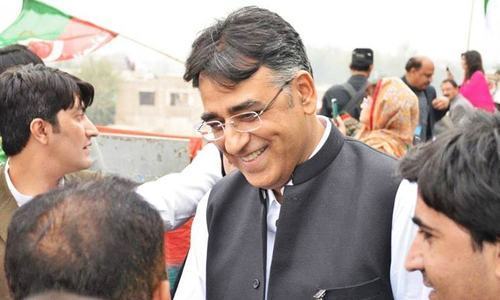ISLAMABAD: Amid criticism from senators over ‘contradictory budget direction’, the government on Monday expressed willingness to reconsider and improve some of the revenue measures, particularly those relating to documentation.
The Senate Standing Committee on Finance led by Dr Farooq Naik of PPP initiated discussion on the supplementary budget announced by Finance Minister Asad Umar last week. The committee will hold its meeting on a daily basis until recommendations for amendments to the supplementary finance bill are finalised.
On the first day, PML-N senators questioned the need for a mini-budget and inquired on the government’s objectives highlighting the confronting policy objectives and revenue measures in the amendments. A few key proposed amendments were deferred for upcoming meetings for want of data and justifications.
As a consequence, the government side ensured of streamlining the issue of ban on purchase of vehicles and property over Rs5 million for non-filers to help facilitate cases relating to inheritance, eligible overseas Pakistani, pensioners and exempt small cars.
The committee proposed that income tax against business income and salaried income should be further reduced to 25 per cent and 20pc respectively instead of 29pc and 25pc proposed in the supplementary finance bill. The FBR did not commit to these recommendations but agreed to report on the suggestions after internal consultations.
Minister of State for Revenue Hammad Azhar said the mini-budget was necessary to stabilise the economy because the country was in a serious crisis situation with history’s highest current account deficit and fiscal deficit of 6.6pc of GDP.
He said the budget presented by the PML-N was extremely irresponsible and some of the measures negatively impacted revenue streams. He said the mini-budget has tried to regain these revenue streams and suppress imports because the country could not afford such high deficits.
For this, he said the government addressed summary relaxation on income tax given in the populist budget of the PML-N and imposed or increased regulatory duties on luxury imports. He stressed the importance of these measures since Pakistan has $8 billion worth of debt repayments due this fiscal year.
He said the current account deficit would have gone beyond $18bn and fiscal deficit in excess of 7.2pc or Rs2.8 trillion in case of business as usual under the budget 2018-19 announced by the PML-N. He said a projection of Rs100bn for gas infrastructure development cess against last year’s collection of Rs15bn due to litigation and Rs130bn extra for petroleum development levy were unrealistic and so was the expectation of Rs285bn provincial cash surplus on back of Rs18bn deficit last year.
Likewise, he said that there was also no contingency for circular debt and no measures to address the losses of the public sector entities worth hundreds of billions of rupees.
Haroon Akhtar contested this saying if the challenges highlighted by Mr Azhar were to be believed then steps proposed in the supplementary budget were not enough to address them. He said the trade deficit had already fallen since the PML-N introduced regulatory duties to suppress imports and as result trade deficit increased marginally by 1pc.
He said the prices of gas, petroleum products; electricity and interest rates hikes would further slow down the economy and severely impact job creation. He said the resultant high inflation coupled with low growth phenomenon would disrupt the strengthening of economy while hike in above mentioned prices would further aggravate the cost of doing business and exports.
He said the PML-N had resisted pressures before going to elections to discourage registration of cars and property beyond Rs5m but the PTI government had surrendered to vested interests within one month of coming into power. He said there could have been teething problems with documentation when discouraging trading of vehicles and real estate in the interest of broadening of tax base which should have been addressed.
Senator Musaddik Malik said the supplementary finance bill appeared to be an accounting exercise rather than a policy to support economic growth and wondered how millions of jobs would be created and economic conditions for the common people improved with rising inflation, slowing economy and limits on small businesses.
He said it was strange that the government blamed previous budget for unrealistic Rs286bn provincial cash surplus and yet did not change it at all.
Senator Mohsin Aziz of PTI said it was not the time to discuss economic vision but the revenue amendments.
Minister Hammad blamed the previous government for debt-driven growth which was criminal negligence and said the measures introduced by the PTI would stabilise the economy, lead to recovery and then move on to the growth trajectory that is linked with development and not with debt and fiscal deficits. He said the exporters were happy with the revised budget.
Published in Dawn, September 25th, 2018














































